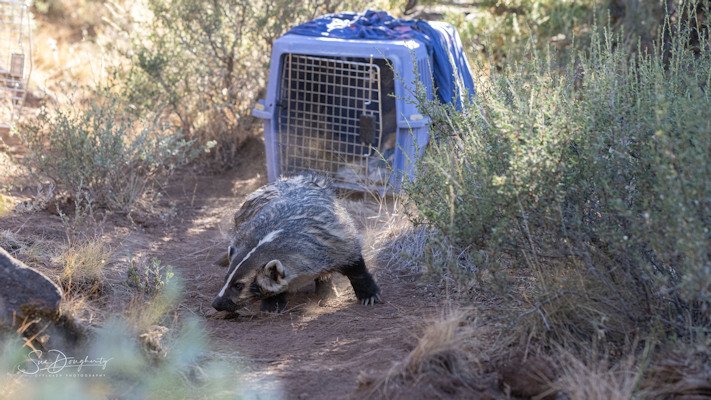Bend’s Think Wild releases 2 orphaned badger cubs back into the wild near Steens Mountain

BEND, Ore. (KTVZ) -- Staff from Think Wild, Bend’s wildlife hospital and conservation center, transported two orphaned, rehabilitated American Badger cubs from their facility to a remote area of BLM land near Steens Mountain last Friday for release back to the wild.
The badgers have been in Think Wild’s care since April, growing and gaining skills they will need for successful lives in their native high desert habitat, the organization said Thursday.
One of the badger cubs, a female, was rescued and brought to Think Wild after being rejected by her mother near Malheur Field Station in Crane She was about 5 weeks old and in good body condition.
Think Wild assembled a species-specific enclosure and protocols for the badger through collaborations with rehabilitators from across the US and Europe.
Around the same time, another badger cub was orphaned near Klamath Falls when his mother was hit by a car. This cub was brought to Wildlife Images, a wildlife hospital in Grants Pass. Wildlife Images contacted Think Wild to discuss best practices to rehabilitate this cub, and then decided to bring the male up to Bend so that both badger cubs could be raised together.
American Badgers are notoriously difficult to rehabilitate because they can easily become habituated to humans, if proper protocols are not followed. In order to develop skills and behaviors for survival in the wild, they must practice foraging, hunting live prey, and self-defense skills that are best gained through interactions with adults and other young badgers.
Staff installed trail cameras in the badger enclosures at Think Wild in order to remotely monitor their development and minimize contact with humans. For feedings and other care, staff wore full camouflage ghillie suits, face masks and shields, rain bibs and boots to minimize human scent.
The badgers were fed a species-appropriate carnivorous diet, generously donated by Inter Mountain Raw, a raw pet food company dedicated to producing whole, quality raw pet diets to the Pacific Northwest. Their donation of raw lamb, pork, chicken, beef green tripe, and poultry liver allowed Think Wild to provide high quality raw food for the quickly growing badger cubs.
Once the badgers were older, Think Wild staff switched them to live prey to ensure they had experience hunting live animals such as mice, quail, and rabbits. They also provided the badgers with sod, donated by several community members, in which the badgers could forage for mealworms and other invertebrates.
Over the three months they spent in Think Wild’s care, the two tiny badger cubs developed into large, healthy juveniles. The female, weighing 700 grams upon intake, is now 7.55 kg (about 16.5 lbs), and the male, 1.02 kg at intake, is now 8.3 kg (about 18.5 lbs). Both developed normal dentition for their age and exhibited age- and species-appropriate growth and behaviors.
“We were excited to see these two juvenile badgers exhibiting normal badger behaviors including digging, burrowing, growling, being fearful of humans, and catching live prey, and are optimistic that they are well-prepared for a successful life in the wild,” says Pauline Hice, Director of Wildlife Rehabilitation at Think Wild. Staff performed vaccinations and final checkups of the badgers last week, and then Think Wild Executive Director Sally Compton released them over the weekend.
“Two of our volunteers drove out to Steens a couple hours before the arrival of the badgers to identify a remote, suitable area near water. We also instructed them to dig a badger hole for the badgers to use upon release,” Compton said.
“I was very impressed by their makeshift hole, and apparently the badgers were too. At first, when we arrived and transported the badgers to the release site, they were angry and snarling. But upon opening the crate doors, they scampered out and promptly began excitedly sniffing, digging, rolling in the dirt, and to our excitement, burrowing down into the hole we’d started for them.”
Think Wild said it expects that the badgers will stay together for another month or two as they grow accustomed to their new home.
American Badgers are normally solitary animals who seek out other badgers during breeding season in the fall. They do not hibernate, but they do sleep for extended periods, especially during extended periods of cold weather and deep snow.
While not a species of high conservation concern, badger populations in North America are vulnerable to climate change and habitat fragmentation.
"Think Wild is hopeful that the release of these two badger cubs will help maintain healthy badger populations in Central and Eastern Oregon," the organization said.
###
About Think Wild
Think Wild is a 501(c)3 non-profit organization located in Bend, Oregon. Our mission is to inspire the High Desert community to care for and protect native wildlife through rescue and rehabilitation, outreach and education, and conservation. We provide veterinary treatment and care at the wildlife hospital, staffed by expert wildlife rehabilitation staff, animal husbandry volunteers, and our staff veterinarian. Wildlife conflicts or injuries can be reported to our Wildlife Hotline at (541) 241-8680, which is monitored seven days a week from 9 AM to 3 PM. Visit us online at thinkwildco.org, or on Instagram and Facebook @thinkwildco.